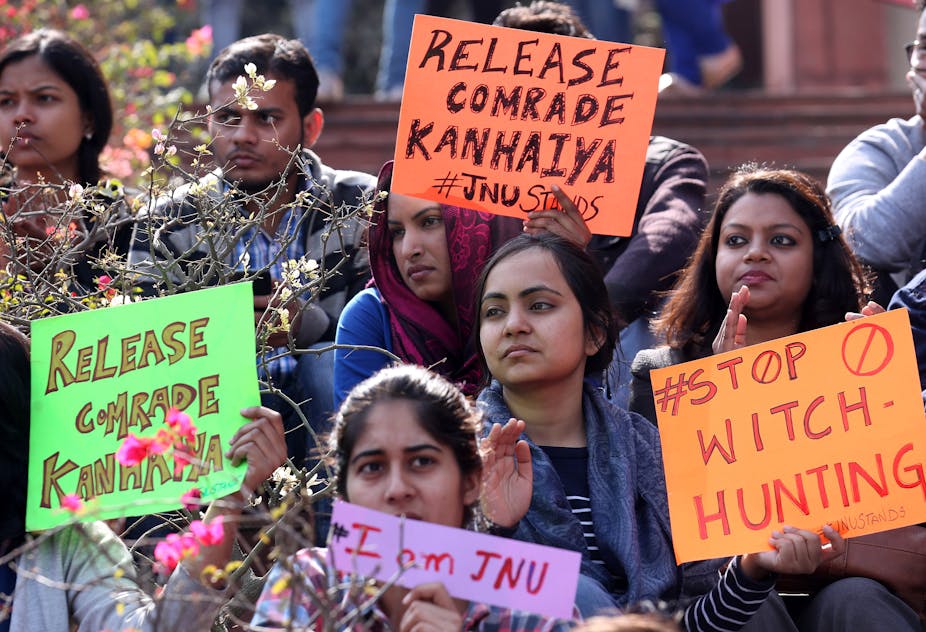On the night of February 12, Kanhaiya Kumar, president of the students union of Jawaharlal Nehru University in Delhi, one of India’s foremost universities, was arrested on charges of sedition. In the words of cabinet minister Smriti Irani, he had insulted the divine “Mother India”.
Protests and sit-ins by angry students and staff have been organised on the campus and in the city. On February 14, thousands of students, alumni and members of the public formed a human chain on campus in a demonstration of solidarity with Kumar.
The crisis is an orchestrated attempt by the ruling Bharatiya Janata Party (BJP) to cultivate resentment and suspicion of the university as harbouring and encouraging “anti-national” forces. A social media campaign – #shutJNU – has proliferated. Jawaharlal Nehru University (JNU) is charged with being an enemy of the nation and of the taxpayer.
“Anti-JNU” protesters who assembled outside of the university gates and who attacked academics, students and journalists at Kumar’s court hearing, were organised by associations affiliated with the BJP: the Sangh Parivar, a family of religious and political organisations committed to a robustly, and exclusively, Hindu version of India – “Hindutva”.

The case against Kumar is slight. His arrest followed his attendance on of a meeting on the JNU campus held the day before to condemn the execution in 2013 of Afzal Guru, a Kashmiri separatist accused of involvement in an attack on the Indian parliament in 2001. Kumar remains incarcerated and has been remanded in judicial custody until March 2.
Critics of the government have pointedly questioned the credentials of a democracy that employs legislation inherited from the colonial era to lock up a student leader for attending a meeting at which “anti-Indian” slogans may have been shouted.
JNU labelled a ‘hub of treason’
Beyond the fragile charges levelled against Kumar, a more diffuse accusation that JNU as an institution is “anti-Indian” has been set out by politicians and anonymous activists. On February 16, the online library catalogue of the university was hacked to display the slogan: “Dear Traitors in JNU …”
The accusation that JNU is, in the words of MP Maheish Girrias, a “hub of treason” is rather dampened by the number of civil servants in India, not to mention members of the current BJP government, who are JNU alumni.
Optimists maintain that the BJP has bitten off considerably more than it can chew in attacking an institution like JNU – an institution that employs many of India’s foremost researchers and intellectuals and that has alumni and research affiliations across the world.
Yet, the ongoing maelstrom of violence in Delhi highlights that JNU’s prestige as a public institution cannot protect it from the antagonism of the current government towards universities.
History of student protest
The current disturbances remind many of the dark days of the “Emergency”, when prime minister Indira Gandhi suspended democratic government for two years between 1975 and 1977 and unleashed widespread repression and violence.
Universities across the country were centres of organised resistance and large numbers of students were arrested and incarcerated. The Jana Sangh, the political party from which the BJP emerged in 1980, was one of the many political organisations that resisted the authoritarian strictures of this period and indeed subsequently benefited from the political allegiances formed while opposing it.
By invoking the protection of “Mother India” in its suppression of free speech at Indian universities, the BJP government has chosen a very large target to hide behind.
During the freedom struggle in India, the figure of Mother India embodied the nation and in turn women (of the right kind) were invited to embody a national ideal. Few political parties have not mobilised her; however, her blend of Hindu divinity, nation and chaste morality has made her a particular favourite of Hindu right-wing politicians who revel in reacting to perceived slights to her honour.
Shifting the debate
The JNU crisis has a more immediate context. A month before Kumar’s arrest, on January 16, Rohith Vemula, a dalit (low-caste) student, committed suicide after being suspended from Hyderabad University. Vemula’s death provoked weeks of public discussion and protest about the continuation of caste oppression in India.
Kumar’s arrest and the organisation of “anti-JNU” demonstrations in Delhi are counter-reactions by the BJP and by Hindu organisations whose politics rest upon the assertion, and violent protection, of a conservative social morality. The aggressive identification of an enemy within the nation, and specifically within universities, has displaced the demands for social change provoked by Vemula’s death.
Students have long been active participants, and leaders, of activism in India, championing the causes of social justice and equality. For decades, and long before the current government came to power, university students have been at the forefront of movements against gender violence, caste oppression, the displacement and impoverishment of rural communities.
From the point of view of any government, JNU is a font of thought and debate and, potentially, an irritant. Long may it continue.

